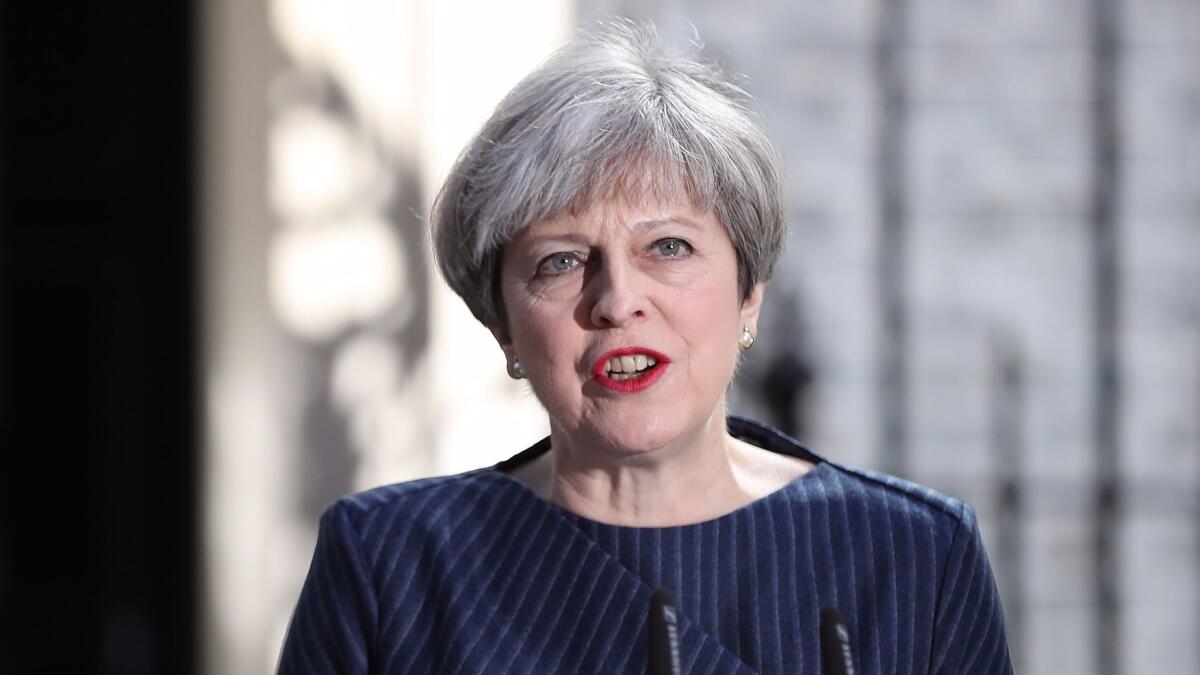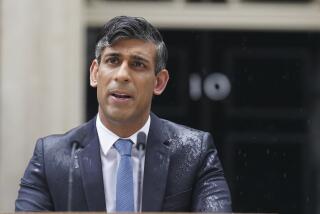In surprise move, British prime minister calls for early election in bid to strengthen ‘Brexit’ plan

- Share via
Reporting from London — Prime Minister Theresa May shocked Britain on Tuesday by calling a snap general election for June 8 in a bid to strengthen her government’s position as it begins negotiating the country’s withdrawal from the European Union.
May said she had come to the decision “with reluctance” but felt that it was the only way to bring about political stability and unity within the nation and, crucially, between lawmakers who continually threaten to derail the whole process.
For the record:
2:15 p.m. April 19, 2017This article incorrectly states that Glasgow is the capital of Scotland. The capital is Edinburgh.
“At this moment of enormous national significance there should be unity here in Westminster, but instead there is division,” she said. “The country is coming together but Westminster is not.”
May’s statement, delivered outside her Downing Street residence, came with little prior warning. She had previously vowed not to hold a general election until 2020, when the current fixed-term Parliament ends, but said she had been forced to abandon that pledge to end the “political game playing.”
“Our opponents believe because the government’s majority is so small, that our resolve will weaken and that they can force us to change course. They are wrong,” she said. “They underestimate our determination to get the job done, and I am not prepared to let them endanger the security of millions of working people across the country.”
May said she was moved to action out of concern that if she let the infighting continue, the government’s negotiating position would be weakened.
She also noted that the so-called Brexit negotiations with the EU would reach their most difficult stage in the run-up to 2020 general election when bitter campaigning could undermine the entire, delicate process.
Supporters branded the move gutsy and bold, including May’s predecessor, David Cameron, who resigned after backing the “Remain” side in last June’s referendum campaign, which resulted in a 52%-48% win for “Leave” supporters.
“Brave — and right — decision by PM,” Cameron wrote on Twitter.
The pound rose 0.7% against the dollar at the news, after a decline of 0.4% in the hour before May’s unscheduled statement.
May’s political rivals were quick to brand the move as shrewd and even self-interested, motivated not out of a desire to bring the country together, but to capitalize on a weak opposition that will enable her to consolidate her Conservative Party’s hold on power.
The election has been called for “selfish, narrow, party-political interests,” said Scottish National Party leader Nicola Sturgeon, who has sought permission from the British government to hold a second Scottish independence referendum once the terms of the Brexit negotiations are known.
Scottish voters backed remaining part of the 28-member EU bloc by 62% to 38%. Sturgeon said May was using this as an opportunity to “crush all opposition” and thereby give herself a free hand to take the country in an increasingly right-wing direction and push through a “hard Brexit” — meaning withdrawing Britain from both the European single market and customs union.
“Now is the time for Scotland’s voice to be heard,” she said, urging voters there to back her party in the forthcoming election and give her a clear sign that they support her fight for a softer Brexit, or a situation where Scotland splits from the rest of the U.K. and remains within the EU.
The Conservative Party secured a slim majority in the 2015 election, winning 330 of the total 650 seats in the House of Commons. But opinion polls show that the party currently has a double-digit lead over the Labor Party, which is beset with infighting and has a divisive leader in Jeremy Corbyn.
The bottom line is it makes Brexit a lot easier for her.
— Anand Menon, a professor of European Politics and Foreign Affairs at King’s College London.
Seeking to capitalize and solidify that majority seemingly became too hard to resist.
“The bottom line is it makes Brexit a lot easier for her,” said Anand Menon, a professor of European Politics and Foreign Affairs at King’s College London. If she wins the election, “it giver her a popular mandate,” he added. “She can say: ‘I’ve laid out the sort of Brexit I’m after.’ and it makes parliamentary life a lot easier for her.”
But winning the election is by no means a done deal as British politics has been nothing if not volatile and unpredictable in the past year. Pollsters did not predict Britain would vote to leave the European Union, they did not expect Cameron to resign in the wake of that vote, and there are few who thought May — who campaigned for the Remain side — would become the next prime minister.
Under the British parliamentary system, elections take place every five years unless the prime minister calls for a snap election and secures the support of two-thirds of members of Parliament.
On Wednesday, May will present her plan for a June election to those lawmakers and ask for their backing. May will seek to make the Brexit strategy that she has already outlined in detail the core campaign issue as battle lines are drawn in coming weeks.
“She will fight it as a ‘Back my strategy for Brexit’ campaign and appeal to ‘Remainers’ on that basis,” said John Curtice, professor of politics at the University of Strathclyde in Scotland’s capital, Glasgow. “It’s a reasonable gamble,” he added.
The Labor Party, however, will no doubt seek to make the campaign about the Conservative Party’s failings rather than Brexit, which has deeply divided the party.
The Liberal Democrats, meanwhile, will relish the chance to gain seats by campaigning on a stridently anti-Brexit platform.
“This election is your chance to change the direction of our country,” said the party’s leader, Tim Farron. “If you want to avoid a disastrous hard Brexit. If you want to keep Britain in the single market. If you want a Britain that is open, tolerant and united, this is your chance.”
But now that Article 50 of the Lisbon Treaty has been formally triggered, starting Britain’s two-year withdrawal process from the European Union, it is not clear whether Brexit can be stopped altogether — even if the electorate massively turns against May’s Conservative Party and her Brexit vision.
“If all the member states in the European Council vote to revoke it, then it can be revoked,” Menon said. “We don’t know if Britain can do it unilaterally. The European Union Court are the only people that can decide.”
That’s ironic, given that Brexit was all about Britain wresting back control of its laws, immigration policies and borders.
But if May’s gamble pays off and she wins decisively?
“This is probably the final nail in the Remainers’ coffin,” Menon added.
ALSO
Syria’s government helped create a rebel bastion — then attacked it with poison gas, the U.S. says
Pence warns North Korea not to ‘test’ Trump, says the ‘era of strategic patience is over’
Turkey’s Erdogan lashes out at West after disappointingly narrow victory
UPDATES:
5:35 a.m.: This article was updated throughout with additional background information and details on Scotland’s referendum.
3:50 a.m.: This article was updated throughout with background information.
12:30 a.m.: This article was updated throughout with background information and viewpoints of British political experts.
This article was originally published at 3:15 a.m.
More to Read
Sign up for Essential California
The most important California stories and recommendations in your inbox every morning.
You may occasionally receive promotional content from the Los Angeles Times.










